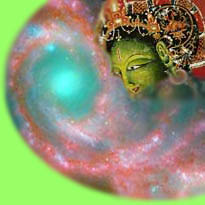|
The Short Commentary on the Tantra of Twenty-one Homages to Tārā called “The Treasure Vase of by Thupten Shedrub Gyatso. |
The One Who Bestows Auspiciousness |
|||||||||||||||||||||
|
12
|
namaḥ śikhaṇḍa-khaṇḍêndu-mukuṭâbharaṇôjjvale | amitābha-jaṭâbhāra-bhāsvāra-kiraṇa-dhruve || namaḥ (n/V) – adoration, homage; śikhaṇḍa – a tuft or lock of hair left on the crown or sides of the head at tonsure; khaṇḍa not full (as the moon); indu (m) – a drop; the drop or spark in the sky, i.e. the moon; mukuṭa (m/n) – diadem; ābharaṇa (n) – ornament, decoration; ujjvale (f/V) – flaming, beaming, beautiful; amitābha – Amitābha, [lit.] of unmeasured splendour; jaṭa – twisted locks of hair; ābhara – bringing towards or near, carrying or fetching, effecting, filling up, attracting (one's attention); bhāsvāra = bhāsvara ? – shining, brilliant, bright, resplendent; kiraṇa – a ray or beam of light, a sun- or moonbeam; dhruve (f/V) – steady, firm, constant, certain, safe. Homage to you, whose diadem is a crescent moon, All your adornments dazzle brightly. Excellent perpetual light shines From Amitābha at your topknot. The twelfth homage is to Tārā, Tashi Dongyed Dolma,Tib the “One Who Bestows Auspiciousness” who brings timely rain, helps with childbirth, and makes places auspicious. This golden Tārā sits on blue lotus and holds an auspicious knot. From the rays of her crescent moon diadem, showers of nectar fall, improving crops and vegetation. Clear and brilliant white light radiates from all of her precious jewels and silken attire. Amitābha, the lord of her Buddha family sits on her black hair knot. From him too, boundless unceasing compassionate rays shine for the benefit of sentient beings. These rays bring a shower of auspicious signs and articles. They cleanse the poisonous bad omens of animate and inanimate existence, causing all beings and their environments to enjoy perfect, glorious, auspiciousness. The ultimate meaning of the first line is ‘direct perception,’ the second line means the ‘enhancing experience’ and the last two of the lines mean ‘the completion stage of the expansion of primordial wisdom and kāyas of the fourth empowerment1,’(Word). 1 empowerment (abhiṣeka skt) ~ A ritual transfer of power, an initiation. The authorization to hear, study and practice the teachings of the Vajrayāna. This takes place in a ceremony that may be extremely elaborate or utterly simple, conducted by a Vajra master. |
|||||||||||||||||||||
|
|

